Welcome to our latest new feature! in My Idea of Fun, Tap-Repeatedly staff will wax poetic about the beloved underdogs – games that we care for but never got the props and attention they deserved. Some you’ll know; some you might hate (but you’re wrong if you do); some will, hopefully, convince you to give them a try. Read on to discover what Helmut, Steerpike, Dix, and AJ consider their idea of fun.
![]()
Helmut
My idea of fun is the original System Shock. I love skulking around in a tech environment. I loved skulking around in a demented magician’s castle in Thief too, but I prefer space ships and hacking and AIs more.
Every Once in a While™, I’ll run across a scene or moment in a game when something the developer has done particularly well will suddenly become clear and I become aware, really completely aware, of the ramifications. It’s almost like a wave of awakening as it dawns on me as to the true meaning of what I’m seeing.
I got this feeling more than once in System Shock. The first was when I was revived from the healing coma and I was retrieving my goods from a locker. I was listening intently to the recording and the voice was reciting what all the levels were for in the space station and I remember thinking, “Oh I hope the place has all that, I expect many of the levels are blocked off… they can’t possibly design a complete space station.”

You start playing on Level 1, and after I cleaned that level and the elevator doors opened in the basement and the basement was just as enormous as the deck above it became clear that the whole space station WAS really going to be that big and was going to contain all that goodness and there was going to be that much to explore, that’s when the wave began to crest.
In other games I always felt a sense of disappointment when approaching the level goals, as there never was enough opposition around the things that should have been pretty darned important to my adversaries. The second wave moment occurred when I approached the CPU room on Level 1 and SHODAN said, “Enter that room, insect, and it will become your grave.”
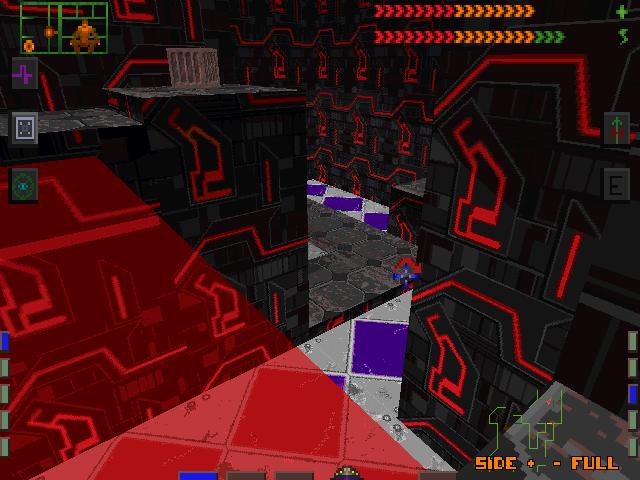
I was really floored by that and the atmosphere created by that single audio clip was totally fresh and original to me at the time. I really felt a foreboding sense of being watched constantly and the gradual release of tension destroying the security cameras and in working upward through the station.
The Ultima series had large levels in 2D and tiles and Doom was all the rage, but this was a puzzler just as much as a shooter and atmospheric as hell and had much better 3D than any game of the time. I’ve played through it a number of times and I’m constantly amazed at how so many elements of the control system were prescient and still in use today. It took me 27 hours (it kept track) to finish the first time with innumerable deaths, backtracks, and false starts not counted in that, and I’ve managed to finish it on hard (it’s just a timed mode) in 4.5 hours. When you know precisely what you’re doing, shortcuts and doorways and well thought out tunnels are available for moving quickly all about the station. Designing levels like this takes an enormous amount of time and care.
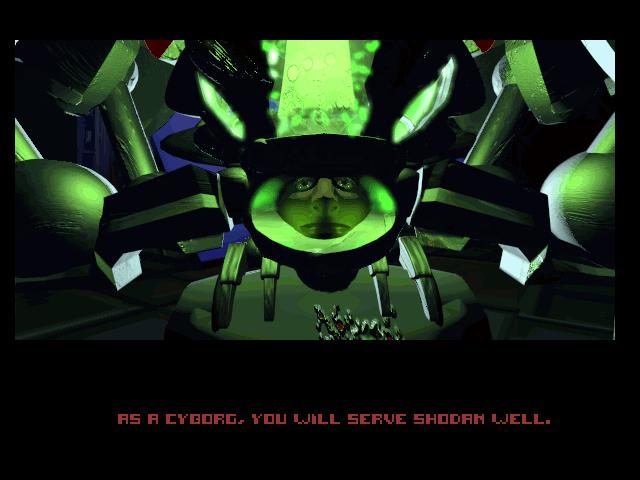
There was nothing better than being alone with the phone off the hook and the lights out with a new system and a new Looking Glass game. You knew you were in for hours of exploration in a well crafted and imaginative world. Of all their offerings, the original System Shock earns the award for my idea of fun.
Matt “Steerpike” Sakey
My idea of fun is Blaster Master for the NES. I don’t recall the game getting a ton of attention at the time, but it was excellent. The over-arching plot is you’re some kid off on a subterranean adventure to rescue his pet frog (I’m not kidding). A barrel of radioactive goo has found its way into the colossal caves beneath your otherwise unassuming suburban home, and it’s turned the roly-polies and slugs and stuff into terrifying monsters. For some reason somebody left a super-advanced experimental tank named S.O.P.H.I.A. just at the entrance to the caves, so fortunately your quest to save the frog needn’t be carried out sans heavy firepower.
S.O.P.H.I.A. is mightily upgradeable, eventually gaining the ability to fly, roll along on ceilings, fire bedrock-destroying plasma, even function underwater. Still, there are places she cannot go, and at these moments you’ve got to pop out of your tank and proceed on foot. Each massive level is structurally open, meaning you and S.O.P.H.I.A. have to explore thoroughly, checking out every nook and cranny before finally finding the region’s boss. S.O.P.H.I.A. can never help you in those fights; she waits, parked outside, while you face them alone. You’re so vulnerable outside the tank, and so dependent on it for most of your progress, that you find yourself developing a close bond with S.O.P.H.I.A., which is part of the game’s charm for me.
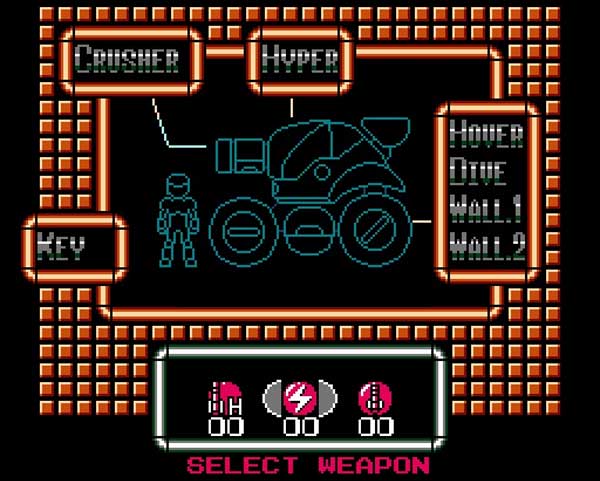
Blaster Master featured a number of impressive design choices that put it into the “Metroidvania” style of exploratory action platformer. It created the illusion, for example, that the entire game world was open and you could go anywhere and do things in any order. This wasn’t technically true; you couldn’t get to level two without the S.O.P.H.I.A. upgrade from the level one boss, couldn’t get to level three without finishing two, and so forth. But it didn’t feel that way, in part because the entrances to these levels were just as nonlinear as the levels themselves: the entrance to level four was in level one, the entrance to level eight was in level three, and so on. You had to look around and take careful note of places you weren’t able to reach, because sooner or later S.O.P.H.I.A. would get an upgrade that would allow you to reach them. And such temporarily insurmountable barriers almost always led to your next destination.
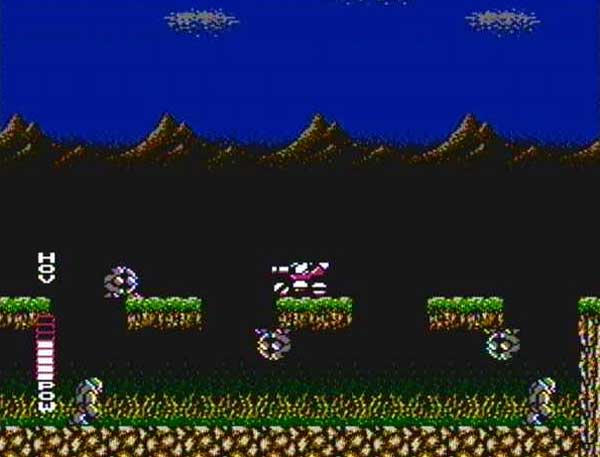
While this technique can be used to make a short game seem longer, Blaster Master is not a particularly small game – a speed run shows it completed in 36 minutes but the author notes that he’s been playing the game for 20 years. Like Metroid, which so deftly created a sense of open exploration and nonlinearity, Blaster Master encouraged you to… well, to master it. The more you played the more you learned, the more you found. While Metroid was a more ambitious game in many respects, it failed to deliver the singular charm of Blaster Master, charm heavily dependent on the player’s relationship with S.O.P.H.I.A.
This is not a game that lends itself to to modern technology. I shudder at the thought of a Blaster Master reboot in first or third person, the inevitably awkward driving controls ruining the entire experience. A Blaster Master remake could be done… but I don’t know if it could be done very well. What seems simplistic now – open worlds, nonlinearity, upgradeable tools – all these things were new once. And while Blaster Master didn’t innovate most of these things, my idea of fun is how well it integrated them.
Brandon “Dix” Perdue
My idea of fun encompasses lots of underrated games, but today I feel like talking about The Darkness, if only to tip the scales toward something that came out this century. Though received well by critics, The Darkness had a pretty quiet release in 2007; I picked it up months later totally on a whim after seeing it mentioned on a list of the year’s Top Ten Endings (I think) in the 2007 wrap-up issue of Game Informer. Heck, lots of publications gave it awards like that, and rightly so. But I think of it as underrated because I’ve yet to ever actually meet a gamer, even a current-gen console shooter gamer, who has actually played it. (At least until I shove it at them.)
The Darkness is the story of hitman Jackie Estacado, who’s on his last job for Uncle Paulie before getting out of organized crime so he can settle down and have a normal life with his girlfriend, Jenny. But Paulie ain’t one to let Jackie outta the game, because he’s basically an evil sonuvagun, and before ya know it Jackie’s barely escaping an explosive double-cross. ‘Course, Paulie ain’t one to stop there, neither.
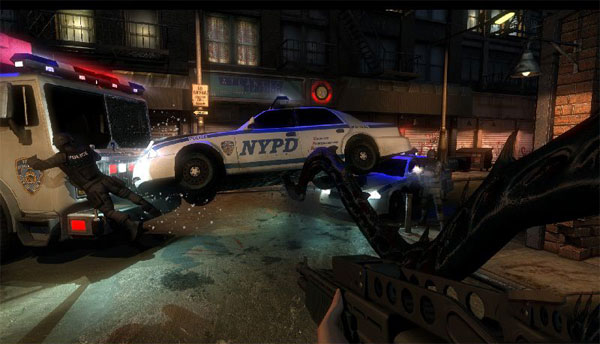
But this mob story isn’t the whole story, as Jackie’s near-death experience awakens in him (summons to him? spawns from him?) the power of an entity called the Darkness, which manifests as a pair of serpentine heads that sprout from Jackie’s shoulders. Now, standing in shadows heals Jackie supernaturally fast; he can summon goblin-like creatures called Darklings, which can be quite comical; he can send out one of the serpent-creatures to hunt down enemies in hiding within a limited range. The only thing he’s gotta do to make his power grow is let the things devour the hearts of his fallen enemies, which actually ends up being tremendously satisfying, truth be told, especially when the two serpents fight over it like two German Shepherds with a rat’s liver, and I don’t mean the fuzzy kind.
And the story could just be a supernaturally-charged quest for vengeance. Easily, it could. But it’s not. It’s so much more than that, really, at its core. Because holy crap do the characters live. Because before the action’s even really started you know how real Jackie and Jenny’s relationship is, you feel that, and it’s brilliant. And that makes the games major climactic bits all the more affecting. Trust me. It’s just…holy crap, even if you know it’s coming.
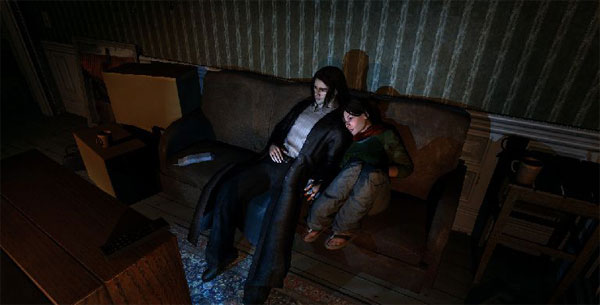
And it’s a game with superb design sensibilities. Yeah, maybe it plays like a lot of other shooters-with-special-powers out there. But those powers are given personality. Everything is. While Jackie’s arsenal is the usual suspects for a modern day shooter – rifles, SMGs, shotguns – his pistol slot is filled by him dual-wielding a pair of whatever pistols he’s picked up off dead guys. It’s fun to just see what he whips out, Beretta in one hand and .38 Special in the other. Empty the magazine and he just drops the gun and draws the next one – whatever it is! And I really love that.
I think maybe the hurdle to it really taking off was the lack of a really solid multiplayer mode. Maybe it was the fact that it was a bit underadvertised, even though this isn’t the first appearance of these characters – The Darkness is based on an ongoing comic book series of the same name, a series which shares a universe with Witchblade. Whatever the case, it’s recently come out that, after a good long wait, we’ll probably be seeing The Darkness II hit our consoles sometime in the future. See you release day.
Amanda “AJ” Lange
My idea of fun is Alpha Protocol. This spy-thriller RPG tried to do a lot of different, unique things, and didn’t do them all with a lot of polish, which caused a pretty bad critical reception when it was first released. That said, I think I have played through it three times, on the strength of its writing alone.
When this game came out, it didn’t get the critical reception I expected. I think a lot of that has to do with how game writers are encouraged to play through one game at a time, as fast as they can. Because of that, it’s difficult to realize just how much of Alpha Protocol your dialog choices really influence, and the game only really shines on a second and third playthrough. You may not have the patience for that if you had a difficult time the first time or picked bad combat trees or allies. But on replays, it starts to click just how entangled the plot is and how much chance you really have to influence it. It lead to a lot of amazing “water cooler” discussions among my friends as we discovered different ways to bend the story and change the outcome. Once I finally mastered the combat trees, I also had fun with some gameplay elements like the takedowns and the crazy chain-shot pistol.
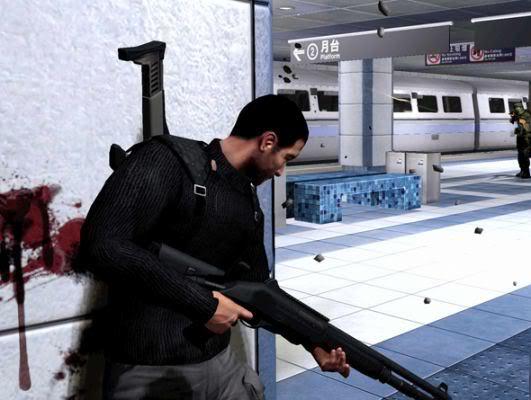
The game had an interesting protagonist in Michael Thornton. The character was, sure, your typical white-male-hero, and kind of a smarmy jerk to boot. But if look at some of the fan videos people have made of his best (jerkiest) moments, you can see how his different rude comments make conversation sequences a riot to play, and to replay. The writing in the game really shines and makes for a lot of hilarious encounters and funny one-liners. I’ll freely admit I love to play games as a smart-ass, so getting to choose for myself which smart-ass line to say boosted my enjoyment tremendously. There’re also some great side characters in the game, like psychopath Stephen Heck. So fun to make friends with, but so fun to be rude to, and there’s an achievement for making him mad enough to sell you out. It’s no wonder I was tempted to play it more than once.
In general, this is going to be a trend with me; if a game has smart writing, I’m willing to give it a pass on gameplay problems. Because of that, I’ll always be a fan of Obsidian, whose reputation is for great writing and a lot of bugs. The team’s writing would really go on to shine in Fallout: New Vegas, which was met with much better critical reception overall. With a larger, open-world game, it seems like more people are willing to give some bugs a pass. And yes, Alpha Protocol is buggy, with at least one show-stopper happening to me every single playthrough.

It’s just that I am completely willing to forgive it that, because there is a boss in the game who powers himself up by playing 80s music and snorting cocaine, then screaming really loud. The first time I saw that I laughed so hard I had to pause the game for several minutes, until I was in tears.
Of course, I could only beat him, on the fifth try, when for some reason he froze up and just stood there letting me shoot him over and over, but… er, details.
![]()
Stay tuned for more installments of My Idea of Fun, whether group contributions like this one or individual rants. There are a lot of underrated games out there, Tappers, and you deserve to shoulder the guilt of not having played them!
![]()


Yes! System Shock! Everyone talks about System Shock 2, but I always considered the first one to be the superior game. This one absolutely terrified me. Playing alone in a dark room didn’t help. Sometimes I would just have to turn it off things got so tense.
I’m going to have to agree with Amanda Lange here, Alpha Protocol is an impressive piece of writing, and I’ve yet to finish the game. Closing in on the end I’m smirking each time things go my way because of how I decided to deal with particular people along the way and beating myself up for letting others slip through the cracks.
One interesting thing about the conversations is that I often find myself not so much roleplaying a jerk or a nice guy, but rather racking my brains for information about the person I’m dealing with to figure out what the best approach would be, what would net me the most gain. This seems a thing of the past, where long conversation trees would lead to either great riches or ignoble anti-climax, a system that always felt wrong for me in a roleplaying game as the logical thing to do would be reload and try again till you got the reward. In Alpha Protocol however, it seems oddly appropriate as you’re playing a person with no fixed identity, lying and cheating as much as flattery and intimidation are all par for the course for a secret agent and so I switch from sucking up to one person to intimidating the next as I hope to get the best out of every situation.
Welcome Deadyawn!
Amanda’s piece actually convinced/reminded me to reinstall Alpha Protocol. Like her I’d really been enjoying it despite the flaws, but ultimately I ran into a graphical bug that made it unplayable. Now that I have a new PC I want to give it another try, because it really was a diamond, no matter how rough.
Brandon’s remarks about The Darkness led me to bump that one up on my “must rent or buy used” list, because I missed it completely and it’s gotten a lot of good press.
Back to Alpha Protocol: one of the things I really enjoyed was that conversations are stressful. You can’t just sit there pondering a response; you have maybe two seconds to decide what to say. It added a whole level to the experience. And it never turned out like Mass Effect, where sometimes the dialogue prompt didn’t really have much to do with what you actually said.
Thank you, Steerpike.
And yes, the time limit on responses certainly added to the tension, the first game that succeeds in making conversation as engaging and sometimes even frantic as the fastest action sections. A few second to remember the other’s profile and decide on an appropriate response. I’ve had more than one occasion where I forgot what I was playing and took the conversations as my cue to light a cigarette and let my guard down only to drop it in my lap in a frantic scramble for the controller.
Before I settled on The Darkness for this piece, I very seriously considered talking Alpha Protocol. I only played it through a few months ago, and despite its level of technical incompleteness I really, really enjoyed it. There’s some lessons there that other RPGs still need to learn.
But not matter. I have quite a list of under-appreciated gems in my library, so this just means I get to move on to other things more quickly…
I also loved System Shock. I still have vivid memories of my playthrough even though it’s been many years. I can’t make that claim for many other games.
Blaster Master was a favorite of mine on the NES. I remember being so happy when I finally beat it! I remember that last boss being a bit tough.
Has anyone played the Blaster Master game for PS1? Or how about Blaster Master Overdrive available through wiiware?
Gngggh. More games to add to my list. Thanks everyone. 😉
Coincimental story: I’d been playing System Shock 2 for some time and was drawing very close to the end for the first time. Anyway, one evening out of curiosity I tried getting the original System Shock working to see/feel what it was like. I played through a fair portion of the first deck and died at a very particular moment involving a sentry turret. After that I decided I wouldn’t play it again until I’d completed the sequel.
SPOILERS!
It just so happened that during my next play session with System Shock 2 I got to the end section which recreates the opening area of System Shock right down to where you start, this is something I wouldn’t have appreciated had I not decided to fire up the original the evening before. Where I died was just above where you face off with SHODAN. Crazy!